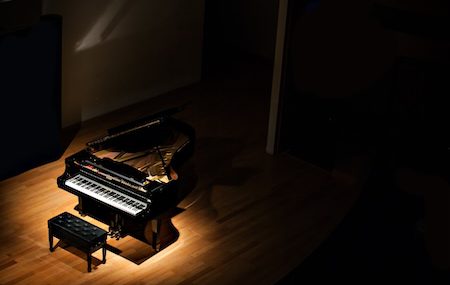When was the last time you took in a live concert or show? It’s a unique experience, watching people perform live in front of an audience. The richness of voices and sounds. The experience of having live entertainment just a few feet away.
Nothing else can take the place of that experience.
And in many cases, at the center of the action is a piano, directing the action, leading the way. Pianos are tailor-made for the stage. Whether they’re in the spotlight, or standing on the sidelines as a revered supporting cast, they add to a performance in a way others can’t.
The Role of Pianos on Stage
The piano’s journey onto the stage can be traced back to the 18th century when it emerged as a revolutionary instrument, surpassing its predecessors in both volume and tonal expression. Pioneering composers such as Mozart and Beethoven composed masterpieces specifically for public performance on the piano, solidifying its place in concert halls and theaters.
During the 19th and early 20th centuries, the piano became the centerpiece of countless musical extravaganzas, from solo recitals to chamber music performances featuring ensembles with piano accompaniment. Its ability to convey a wide range of emotions—from tender lyricism to thunderous power—captivated audiences and elevated live performances to new heights.
The piano commands attention, serving as both a visual focal point and an auditory anchor for the audience.
In solo performances, the piano takes center stage, drawing listeners into its sonic embrace with each nuanced phrase and dynamic flourish. Its resonant tones fill the concert hall, creating a sense of intimacy that transcends the physical space between performer and audience.
In ensemble settings, the piano serves as a versatile collaborator, providing harmonic support, rhythmic drive, and melodic counterpoint. Whether accompanying a vocalist, joining forces with string quartets, or anchoring a jazz ensemble, the piano adds depth and dimension to the musical landscape, enhancing the overall experience for performers and listeners alike.
Factors to Consider for Stage Pianos
Are you looking for a piano for stage performances?
Stage pianos must withstand the rigors of frequent transportation, heavy usage, and varying environmental conditions without compromising performance quality. Sturdy construction, reinforced casing, and robust internal mechanisms are essential features that help ensure a piano’s longevity and reliability on stage. Whether touring with a band or performing in a bustling concert venue, a durable piano provides peace of mind to performers and maintains consistent performance quality throughout its lifespan.
A stage piano must produce clear, resonant tones capable of filling a large venue and captivating audiences with its rich, expressive sound. From the sparkling highs of the treble register to the thunderous depths of the bass, every note should ring true and project effortlessly into the acoustic space. Advanced sound reproduction technologies, high-quality materials, and meticulous craftsmanship contribute to the superior sound quality of stage pianos, ensuring an immersive listening experience that transcends the confines of the stage.
While sound quality is undoubtedly essential, the visual aesthetics of a stage piano also play a significant role in enhancing the overall performance experience. The piano serves as a centerpiece on stage, commanding attention with its elegant design and captivating presence. Sleek finishes, polished surfaces, and attention to detail in craftsmanship contribute to the piano’s aesthetic appeal, complementing stage design and creating a memorable visual impression. Whether exuding timeless elegance in a classical concert setting or radiating contemporary sophistication in a modern performance venue, the aesthetics of a stage piano reflect the artistry and creativity of its surroundings, elevating the entire performance to new heights.
A stage piano must be capable of accommodating various musical styles, performance requirements, and artistic preferences with ease and flexibility. From classical repertoire to jazz standards, pop hits to experimental improvisations, the piano should adapt seamlessly to diverse musical contexts and performance styles. Adjustable settings, customizable sound options, and intuitive interface controls empower performers to tailor their sound to suit the unique demands of each performance, unlocking new creative possibilities and expanding the horizons of musical expression on stage.
A New Piano …
You need a new piano. You know what you want. But finding a piano that takes center stage can be challenging.
With decades of experience, we understand what the perfect piano does for an organization. And we’re happy to find one tailor-made for your unique situation.


